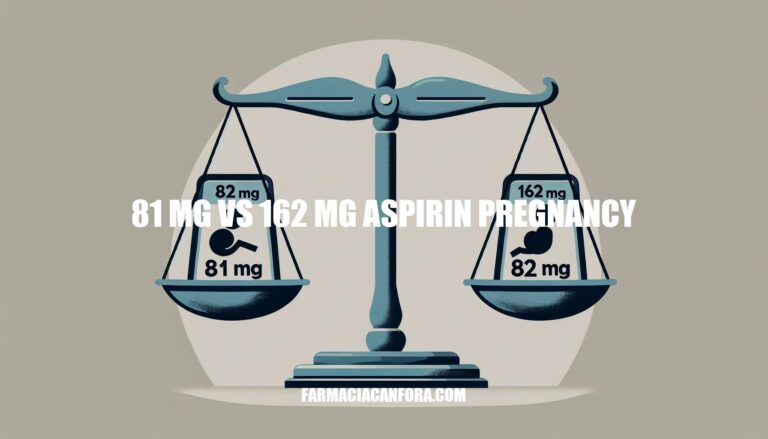


When it comes to aspirin use during pregnancy, understanding the differences between 81 mg and 162 mg dosages is crucial. These dosages are often recommended to prevent complications like preeclampsia, a serious condition that can affect both the mother and baby. Knowing the implications of each dosage helps ensure the safety and health of both during pregnancy.
81 mg Aspirin:
162 mg Aspirin:
These guidelines highlight the importance of dosage and timing in reducing the risk of preeclampsia during pregnancy. Always consult with a healthcare provider for personalized advice.
Using 81 mg of aspirin daily during pregnancy offers several benefits, particularly for women at high risk of preeclampsia:
Prevention of Preeclampsia: Low-dose aspirin is effective in reducing the risk of preeclampsia, a condition characterized by high blood pressure and potential damage to other organ systems. It is recommended to start between 12 and 28 weeks of gestation, ideally before 16 weeks.
Reduction in Preterm Birth: Aspirin can help lower the chances of preterm birth, which is often associated with preeclampsia.
Decrease in Fetal Growth Restriction: It helps in preventing fetal growth restriction, ensuring better growth and development of the baby.
Lower Risk of Stillbirth: There is evidence suggesting that low-dose aspirin may reduce the risk of stillbirth.
Safety: Low-dose aspirin is generally considered safe for both the mother and the baby when taken as prescribed.
These benefits make low-dose aspirin a valuable preventive measure for pregnant women at risk of these complications. Always consult with a healthcare provider before starting any medication during pregnancy.
Using 162 mg aspirin during pregnancy, compared to 81 mg, has shown several potential advantages:
These benefits suggest that a higher dosage may offer better protection against certain pregnancy complications without additional risks.
81 mg Aspirin:
162 mg Aspirin:
It’s crucial to consult with a healthcare provider before taking any medication during pregnancy to weigh the benefits and risks specific to your situation.
Comparative studies on 81 mg vs. 162 mg aspirin during pregnancy have yielded some significant findings:
Prevention of Preeclampsia: Higher doses of aspirin (150-162 mg) have been shown to significantly reduce the risk of preterm preeclampsia compared to lower doses (75-81 mg). This reduction is particularly notable when aspirin is started in the first trimester.
Efficacy and Safety: Studies indicate that 162 mg aspirin is more effective in lowering the rate of preeclampsia among high-risk patients without increasing the risk of bleeding complications.
Clinical Recommendations: The US Preventive Services Task Force recommends low-dose aspirin (81 mg) for pregnant individuals at high risk for preeclampsia, highlighting its substantial net benefit in reducing risks of preeclampsia, preterm birth, and perinatal mortality.
These findings suggest that while both dosages are beneficial, the higher dosage may offer more significant protective effects against preeclampsia without additional safety concerns.
When it comes to aspirin use during pregnancy, understanding the differences between 81 mg and 162 mg dosages is crucial. These dosages are often recommended to prevent complications like preeclampsia, a serious condition that can affect both the mother and baby. Knowing the implications of each dosage helps ensure the safety and health of both during pregnancy.
The American College of Obstetricians and Gynecologists (ACOG) and Society for Maternal-Fetal Medicine (SMFM) recommend 81 mg daily starting between 12 and 28 weeks of gestation, ideally before 16 weeks, for individuals at high risk of preeclampsia. The US Preventive Services Task Force (USPSTF) suggests 81 mg daily after 12 weeks for those at high risk, including those with multiple moderate-risk factors.
Using 81 mg of aspirin daily during pregnancy offers several benefits, particularly for women at high risk of preeclampsia: prevention of preeclampsia, reduction in preterm birth, decrease in fetal growth restriction, lower risk of stillbirth, and safety. These benefits make low-dose aspirin a valuable preventive measure for pregnant women at risk of these complications.
Using 162 mg aspirin during pregnancy has shown several potential advantages, including reduced preeclampsia rates, lower risk of preterm preeclampsia, and no increase in bleeding complications. However, higher doses are associated with greater risks, including increased chances of pregnancy loss, congenital defects, and bleeding complications.
Comparative studies on 81 mg vs. 162 mg aspirin during pregnancy have yielded significant findings: prevention of preeclampsia, efficacy and safety, and clinical recommendations. These findings suggest that while both dosages are beneficial, the higher dosage may offer more significant protective effects against preeclampsia without additional safety concerns.
In conclusion, when considering aspirin use during pregnancy, it is essential to consult with a healthcare provider to weigh the benefits and risks specific to your situation. They can help determine the best course of action based on individual risk factors and medical history.